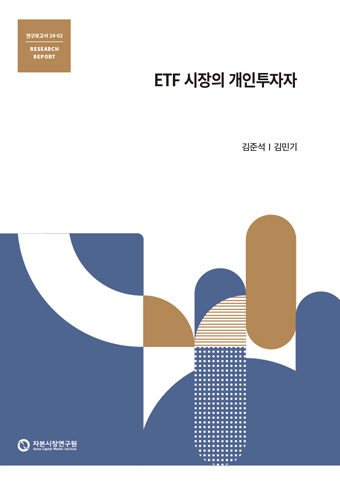Latest Publictions

2024 Jan/24
A comprehensive study of retail investors in the Korean ETF markets
Research Papers 24-02
PDF
- Research Topic Capital Markets
- Page 74
- Summary
- Participation of retail investors in the Korean ETF market has increased significantly throughout the COVID-19 pandemic. Before the outbreak, the cumulative net purchases of ETFs by retail investors amounted to only 6.2 trillion won. However, since then, the cumulative net purchases have risen dramatically to over 20 trillion won. The trading volume of retail investors has also increased substantially from around 15 trillion won per month before the outbreak to around 60 trillion won per month. ETFs have become a major investment vehicle for retail investors in Korea.
The most prominent feature of ETF trading by retail investors is the high proportion of trading in derivative ETFs. Since the introduction of leveraged and inverse ETFs, 60-70% of retail investors' ETF transactions have been generated from these ETFs. The problem is that leveraged and inverse ETFs are short-term, speculative products that are structurally complex and unsuitable as long-term investment vehicles. If the low cost and high accessibility of ETFs are utilized for speculative trading rather than contributing to the expansion of diversified investment opportunities, it is not desirable from the both perspective of retail investors’ investment performance and the development of the ETF market.
This paper comprehensively examines the characteristics of retail investors’ ETF holdings and transactions, and the impact of ETFs on investment performance by utilizing the securities holdings and transactions data of 136,000 Korean retail investors from January to October 2020. The characteristics of ETF investors in terms of ETF holdings and transactions can be summarized as follows. First, the number of investors who held or traded ETFs during the period analyzed is about 17% of the total investors, and they are mainly male investors with large investment sizes and experience. Second, ETF investors, compared to non-ETF investors, have a relatively high level of portfolio diversification, but they are also speculative with a high turnover rate and proportion of derivative ETFs held and traded.
The results of the analyses of the impact of ETFs on investment performance are summarized as follows. First, we find that ETFs harm retail investors' investment performance. Both the monthly portfolio return and the Sharpe ratio increase when ETF holdings and transactions are excluded from the total holdings and transactions of ETF investors. Second, we find that the negative impact of ETFs on investment performance is mainly driven by inverse ETFs. Regressions controlling for investor characteristics, risk factors, and portfolio characteristics show that both portfolio returns and Sharpe ratios decline as the percentage of holdings or turnover in inverse ETFs increases. For other ETF types, the Sharpe ratio increases with increasing holdings. Third, intraday trading in ETFs appears to improve portfolio performance. However, the magnitude of the improvement is very small. Fourth, for portfolio component replacement decisions, buying ETFs worsens portfolio returns, and selling ETFs improves portfolio returns. These results are particularly evident for inverse ETFs.
We find a positive effect of ETFs on reducing portfolio risk as a diversified investment tool, but this is overwhelmed by the negative effect of holding inverse ETFs on returns. However, it is not sufficient to interpret these results simply as a result of the upward trend of the stock market during the sample period. Retail investors' overconfidence that the market is overvalued, the lack of understanding of the structural features of inverse ETFs, and the disposition effect, whereby investors ignore accumulated losses, could all contribute to their holding of inverse ETFs during the sample period. We cannot rule out the possibility that the same negative effects could be seen with leveraged ETFs in a bear market.
To establish ETFs as a useful investment vehicle for retail investors, efforts to control the negative effects of derivative ETFs are necessary. A more rigorous review of whether derivative ETFs cause retail investors to over-trade, expose them to unexpected additional risks, provide regulatory arbitrage over other derivative products, and assess their suitability for retail investors is essential.